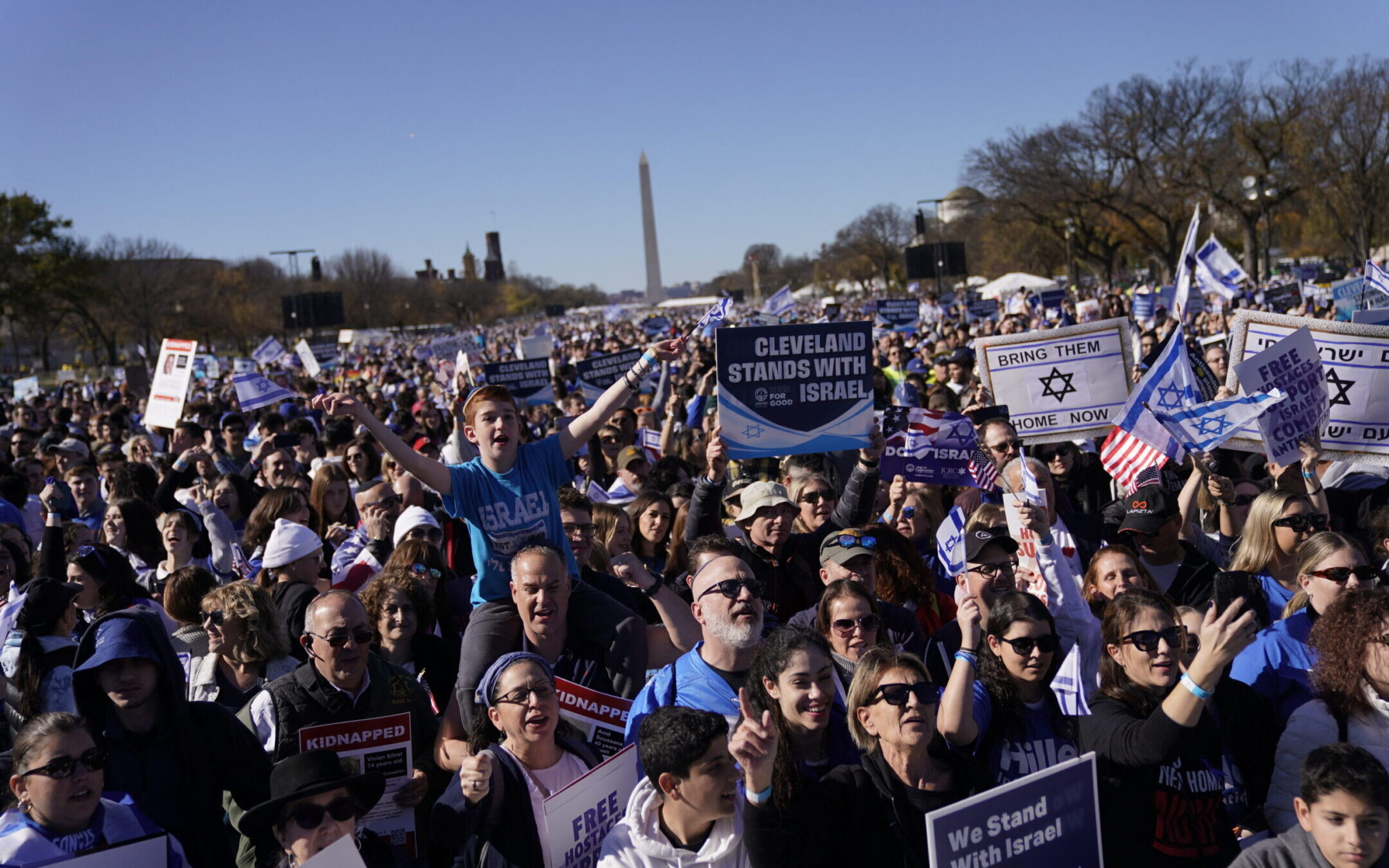Most Americans and nearly all American Jews say antisemitism has risen since Oct. 7, survey finds
The survey also found that 74% of Jews say they have been personally offended by something they saw or read about the Israel-Hamas war

Demonstrators in support of Israel gather to denounce antisemitism and call for the release of Israeli hostages, on the National Mall in Washington, DC, Nov. 14, 2023. (Stefani Reynolds / AFP via Getty Images)
(JTA) — Most Americans, and nearly 90% of American Jews, say they have seen a rise in antisemitism since Oct. 7, according to a new study.
But the survey also found that one in 10 respondents says Americans should be allowed to call for violence against Jews or Muslims. By contrast, 73% say such calls should be prohibited.
The survey, published Tuesday by the Pew Research Center, comes following widespread reports of rising antisemitism in the United States since the outbreak of the Israel-Hamas war on Oct. 7. It found that increasing shares of Americans, and American Jews, believe there is a high level of antisemitism and Islamophobia in the United States.
But along with the minority of respondents who say calls for antisemitic or anti-Muslim violence should be allowed, the survey showed that most Americans say advocacy for the end of a Jewish state or the prevention of a Palestinian one should also be permitted. Adults under 50 were slightly more likely than older Americans to say that calls for violence against either religious group should be allowed.
“Many Americans particularly sense that discrimination against Muslims and Jews has risen since the start of the Israel-Hamas war,” reads an introduction to the survey on Pew’s website. “The vast majority of U.S. Muslims and Jews themselves agree.”
The text adds, “It finds that Americans are broadly comfortable with speech both for and against Israeli and Palestinian statehood. But most U.S. adults are not OK with calls for violence against Jews or Muslims.”
The survey, taken in February, polled more than 12,600 people and had an overall margin of error of 1.5%. The margins of error for the Jewish and Muslim segments were 3.3% and 8.4%, respectively.
It comes following a Pew survey showing most Jewish Americans support Israel’s war against Hamas, as well as how it is being fought. Americans overall are mostly supportive of Israel’s reasons for going to war and are split on Israel’s military conduct.
The survey showed that 67% of Muslims and 72% of Jews perceive “a lot” of discrimination against their own respective groups. But only 17% of Muslims reported seeing a lot of discrimination against Jews, the lowest number of any religious group polled. Among Americans overall, 40% say there is a lot of discrimination against Jews, double the figure from a 2021 poll.
Meanwhile, 57% of Jews polled say there is “a lot” of discrimination against Muslims, the highest number of any non-Muslim religious group polled. Still, that figure represents a decline from the 2013 survey of American Jews, in which 72% of Jews said Muslims face a lot of discrimination. In Tuesday’s survey, 44% of Americans overall said Muslims face a lot of discrimination.
Among respondents younger than 30, most said Muslims face a lot of discrimination, while only 31% said Jews face a lot of discrimination.
Overall, majorities of Americans — as well as majorities of Jews — are comfortable with speech both for and against Palestinian statehood, and for and against Israel existing as a Jewish state. Slightly more than a third of Jews said calling for the end of a Jewish state should be prohibited.
Tuesday’s survey also found that 74% of American Jews and 60% of Muslims say they have been personally offended by something they saw or read on the news or on social media about the Israel-Hamas war. Roughly a quarter of each group says they have also stopped talking to someone in person or unfollowed or blocked someone online due to something that person said about the war.
CORRECTION: This article has been corrected to remove the reference to the 2020 survey of American Jews.














